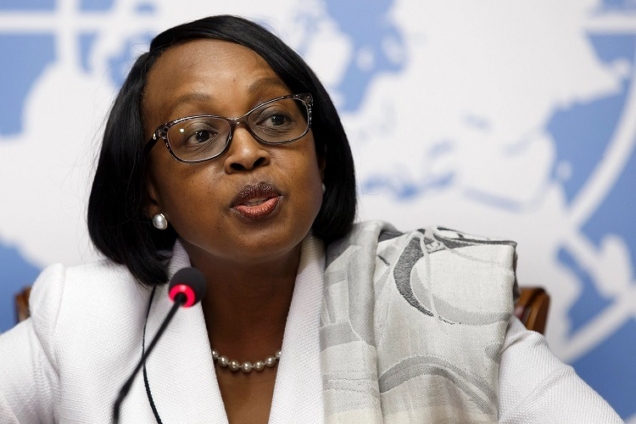On World Health Day, 7 April 2023, we began a year-long commemoration of WHO’s 75th Anniversary. I thank our Member States, partners, and stakeholders for their enthusiasm and support. It has been a season rich in festivities and reflections.
We’ve looked back on public health successes that have improved the quality of life of populations during the last seven decades and summoned the energy to tackle the health challenges of the next 75 years.
As we close the celebrations today, the theme for World Health Day 2024, “My Health, My Right” is
appropriate to recall how we increased the rights of our region’s people through health.
With our Member States, we have made significant progress in ensuring better health outcomes for our people over the past decade. More mothers and children are surviving today than before. From 2000 to 2020, the life expectancy of African women increased from 54 to 67 years; the maternal mortality ratio decreased by 33% (from 788 to 531 maternal deaths per 100 000 lives), and the number of children dying before the age of 5 was reduced by 50% from 2000 to 2017.
Between 2011 and 2021, the number of new HIV infections and AIDS-related deaths decreased by 44% and 55%, respectively, across Africa, and the number of TB deaths decreased by 26%. In addition, several diseases are on the verge of eradication and elimination, including polio, guinea worm disease, as well as maternal and neonatal tetanus.
I also applaud our Member States’ efforts to accelerate progress towards Universal Health Coverage (UHC). They are reforming their health policies and revamping legislative and regulatory frameworks, including National Health Insurance Schemes (NHIS) and Social Health Insurance (SHI) schemes to reduce catastrophic out-of-pocket health expenditures.
Several countries have started operationalizing an integrated Life Stages Approach, which prioritizes the health of individuals at every stage of their life and the care needed at any time.
Health is not only a fundamental human right, but also central to peace and prosperity. Thus, addressing health inequities requires intentional efforts.
Considerations of vulnerable groups must be assessed. Their needs ought to be purposively integrated into health programmes at all levels to accelerate progress toward UHC.
We know that many in our region still need help with access to quality essential health services due largely to unfulfilled rights. This is further compounded by protracted and ongoing crises such as conflicts, climate change, food insecurity, disease outbreaks, and epidemics.
The number of people aged 15 and over living with HIV is still high at an estimated 24.3 million in 2021 (3.4 % of the total population) compared to 15.6 million in 2005. This reflects the continued transmission
of HIV despite reductions in the incidence of people newly infected and the benefits of significantly expanded access to antiretrovirals.
Disparities in the coverage of key reproductive, maternal, newborn, child, and adolescent health interventions remain significant, with the rural dweller, the poor, and those in hard-to-reach areas being the most disadvantaged. Furthermore, about 8% of the population in the African Region is still experiencing catastrophic health expenditures.
I urge our Member States to uphold the progress towards fulfilling the right to health, agreed by all nations of the world in 1948 and enshrined in the WHO Constitution.
The right to health is a universal right of all human beings, regardless of race, color, sex, language, religion, political or other opinion, national or social origin, property, birth, or another status.
During the High-level meeting on Universal Health Coverage during the 78th session of the UN General Assembly, our Heads of State and Government committed to scale-up efforts to build and strengthen quality, people-centered, sustainable, and resilient health systems. I urge all stakeholders to play their part in supporting our leaders in delivering on this commitment.
We will continue to work with you all to strengthen health governance and combat discrimination and inequalities in health; we will continue to collaborate across sectors on bold solutions toward the universal coverage of high-quality health care for everyone, everywhere – because it is part of our human rights!
Latest Stories
-
A Highway of Tears: Ghana’s road safety crisis demands action now
8 minutes -
Ras Mubarak: Open letter to Ghana’s Minister of Transport
14 minutes -
UniMAC hosts Dr Bryan Acheampong for landmark AI and future of work lecture
24 minutes -
The future of work belongs to humans who know how to work with machines – Dr Bryan Acheampong
31 minutes -
Atwima Nwabiagya MP calls for developing Barekese and Owabi dams into tourist sites
46 minutes -
Ghana–China ties deepen as Chief of Staff hosts high-level Chinese investor delegation
46 minutes -
Minority demands PURC justify 2.45% tariff hike amid declining economic indicators
50 minutes -
New book “The Essence of Ghana” to launch July 1, celebrating national identity through commemorative days
54 minutes -
Goosie Tanoh presents 24-hour economy document to Speaker, policy kicks off on July 2
1 hour -
Prof Ali-Nakyea narrates how 2016 Range Rovers were falsely declared as 2003 Peugeots at Takoradi Port
1 hour -
CPP expresses gratitude for reinstatement of Republic Day and Founder’s Day
1 hour -
Tema Oil Refinery participates in 2025 Ghana-China Business Summit
2 hours -
Police arrest 2 in Wassa Akropong for tampering with credit-sold mobile phones
2 hours -
Corruption thriving on systemic loopholes – Prof. Ali-Nakyea
3 hours -
Education Minister inaugurates boards of CTVET and Ghana Library Authority
3 hours

